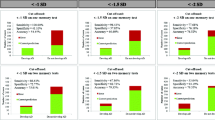Summary
OBJECTIVE: The goals of this study were to determine the annual conversion rate to Alzheimer disease (AD) among patients reporting memory problems, including a subgroup with amnestic mild cognitive impairment (aMCI), and to investigate the predictive value of neurocognitive testing for future dementia. METHODS: A prospective study was carried out in an outpatient memory clinic. One hundred and seven patients underwent a clinical examination and completed a battery of standard cognitive tests at study entry and two years later. The conversion rate to clinically manifested AD two years later was investigated, and sensitivity, specificity, receiver operating characteristics (AUC), positive predictive value and negative predictive value for each neuropsychological test were determined. RESULTS: We found an annual rate of conversion to AD of 6.5% among patients reporting memory decline in the setting of our clinic. Specifically, patients with aMCI had an annual conversion rate of approximately 20%. The annual conversion rate for patients reporting memory problems but showing no memory deficit at memory testing was approximately 3%. Receiver operating characteristics (AUC) of the neuropsychological tests ranged from 0.60 to 0.94. CONCLUSIONS: Patients with aMCI have 8.6-fold higher odds of developing AD compared with patients without evident memory impairment on neuropsychological testing. Although the risk of developing AD among patients without objective memory decline is small, some patients in this group still convert to AD, and therefore, close clinical monitoring of patients is necessary.
Zusammenfassung
ZIEL: Ziel der vorliegenden Studie war die Bestimmung der jährlichen Konversionsrate von Patienten mit subjektiver Gedächtnisbeeinträchtigung zur Alzheimerkrankheit unter Berücksichtigung der amnestischen Milden Kognitiven Störung (aMCI). Die Wertigkeit zur Vorhersage der Konversion durch einzelne neuropsychologische Testverfahren wurde ebenfalls untersucht. METHODIK: Im Rahmen einer Gedächtnisambulanz wurde eine prospektive Studie durchgeführt. 107 Patienten wurden in die Studie inkludiert. Alle Patienten durchliefen eine neurologische und eine neuropsychologische Untersuchung am Beginn der Studie und nach zwei Jahren am Ende der Studie. Einerseits wurde die Konversionsrate zur Alzheimerkrankheit untersucht, und anderseits wurden einige Kennwerte der Kriteriumsvalidität (Sensitivität, Spezifität, Receiver Operating Characteristics [AUC], Positive Predictive Value, Negative Predictive Value) einzelner neuropsychologischer Testverfahren zur Vorhersage der Alzheimerkrankheit bestimmt. RESULTAT: Wir fanden eine jährliche Konversionsrate von 6,5 % für Patienten, die eine Beeinträchtigung der Gedächtnisfunktionen berichteten. Patienten mit aMCI hatten eine jährliche Konversionsrate von ungefähr 20 %. Die jährliche Konversionsrate von Patienten mit subjektiver Gedächtnisbeeinträchtigung ohne testpsychologisch nachweisbare Gedächtnistörung lag bei ungefähr 3 %. Receiver operating characteristics (AUC) für einzelne neuropsychologische Verfahren lagen zwischen 0,60 und 0,94. KONKLUSION: Patienten mit aMCI haben, im Vergleich zu Patienten ohne neuropsychologisch fassbare Gedächtnisstörung, eine 8,6-fache Wahrscheinlichkeit, innerhalb von zwei Jahren eine klinisch manifeste Alzheimerkrankheit zu entwickeln. Obwohl die Wahrscheinlichkeit für Patienten ohne neuropsychologisch fassbare Gedächtnisstörung, innerhalb von zwei Jahren eine Alzheimerkrankheit zu entwickeln, gering ist, konvertieren einige wenige Patienten doch zur Alzheimerkrankheit. Engmaschige Kontrolluntersuchungen sind deshalb notwendig.
Similar content being viewed by others
Author information
Authors and Affiliations
Corresponding author
Rights and permissions
About this article
Cite this article
Lehrner, J., Gufler, R., Guttmann, G. et al. Annual conversion to Alzheimer disease among patients with memory complaints attending an outpatient memory clinic: the influence of amnestic mild cognitive impairment and the predictive value of neuropsychological testing. Wien Klin Wochenschr 117, 629–635 (2005). https://doi.org/10.1007/s00508-005-0428-6
Received:
Accepted:
Issue Date:
DOI: https://doi.org/10.1007/s00508-005-0428-6




